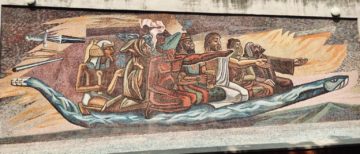Anna Della Subin in The Paris Review:
 “We were superior to the god who had created us,” Adam recalled not long before he died, age seven hundred. According to The Apocalypse of Adam, a Coptic text from the late first century CE, discovered in Upper Egypt in 1945, Adam told his son Seth that he and Eve had moved as a single magnificent being: “I went about with her in glory.” The fall was a plunge from unity into human difference. “God angrily divided us,” Adam recounted. “And after that we grew dim in our minds…” Paradise was a lost sense of self, and it was also a place that would appear on maps, wistfully imagined by generations of Adam’s descendants. In the fifteenth century, European charts located Eden to the east, where the sun rises—an island ringed by a wall of fire. With the coordinates in their minds, Europe’s explorers could envisage a return to wholeness, to transcendence, to the godhood that had once belonged to man.
“We were superior to the god who had created us,” Adam recalled not long before he died, age seven hundred. According to The Apocalypse of Adam, a Coptic text from the late first century CE, discovered in Upper Egypt in 1945, Adam told his son Seth that he and Eve had moved as a single magnificent being: “I went about with her in glory.” The fall was a plunge from unity into human difference. “God angrily divided us,” Adam recounted. “And after that we grew dim in our minds…” Paradise was a lost sense of self, and it was also a place that would appear on maps, wistfully imagined by generations of Adam’s descendants. In the fifteenth century, European charts located Eden to the east, where the sun rises—an island ringed by a wall of fire. With the coordinates in their minds, Europe’s explorers could envisage a return to wholeness, to transcendence, to the godhood that had once belonged to man.
Every time he stepped off the ship’s rowboat and onto the soft sand, exploring places later known as Cuba, Haiti, and the Bahamas, Columbus seemed to walk on the clouds. On December 13, he wrote that a chieftain had informed a crowd of two thousand fearful, trembling kinsmen that “the Christians were from heaven.” The people put their hands on their heads, in “a sign of great reverence,” and made offerings of yams and fish. Approached by an envoy of hundreds of islanders several days later, Columbus again recorded their belief in his celestial status, although he noted that the chief and his advisers “were very sorry that they could not understand me, nor I them. However,” he continued, “I knew that they said that, if I wanted anything, the whole island was at my disposal.” Conquest followed apotheosis: every island he found, filled with people allegedly mistaking him for divine, the mariner took possession of for Spain. He would read an indecipherable declaration, then pause for a refusal that could not occur. “No opposition was offered to me,” Columbus wrote.
More here.
